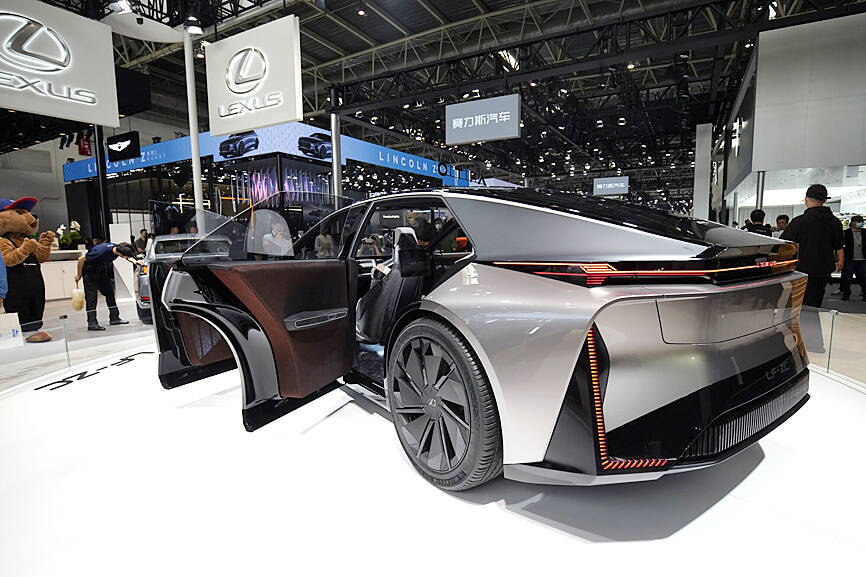Toyota Motor Corp plans to build an electric vehicle (EV) factory in Shanghai for its luxury Lexus brand, media reports said yesterday, at a time when many foreign automakers are struggling in China.
The world’s top-selling automaker aims to bring the factory online about 2027 and would operate it without a local partner, Japan’s Nikkei business daily said, citing sources.
That would make it the first Japanese vehicle factory of its kind in China, the Nikkei said.

Photo: Bloomberg
Toyota declined to confirm the plan when contacted.
Public broadcaster NHK said Toyota hoped that building the new plant would help it catch up in the Chinese market.
China overtook Japan as the biggest vehicle exporter last year, helped by its dominance in EVs, a sector where Japanese firms have lost ground by focusing on hybrid vehicles.
Honda Motor Co and Nissan Motor Co, Japan’s number two and three automakers after Toyota, on Monday agreed to launch talks on a merger to help them strengthen their position on EVs and self-driving tech.
Citing “dramatic changes in the environment surrounding both companies and the automotive industry,” Honda and Nissan said they plan to list a holding company in August 2026.
Lackluster consumer spending and tough competition in several markets is making life hard for many automakers.
However, Toyota’s strategy to offer a range of vehicles, including hybrids, has paid off in markets such as the US.
The planned Shanghai factory would mainly produce Lexus models, the Nikkei said, adding that Toyota mostly sells Japanese-made Lexus vehicles in China.

Nvidia Corp chief executive officer Jensen Huang (黃仁勳) on Monday introduced the company’s latest supercomputer platform, featuring six new chips made by Taiwan Semiconductor Manufacturing Co (TSMC, 台積電), saying that it is now “in full production.” “If Vera Rubin is going to be in time for this year, it must be in production by now, and so, today I can tell you that Vera Rubin is in full production,” Huang said during his keynote speech at CES in Las Vegas. The rollout of six concurrent chips for Vera Rubin — the company’s next-generation artificial intelligence (AI) computing platform — marks a strategic

Enhanced tax credits that have helped reduce the cost of health insurance for the vast majority of US Affordable Care Act enrollees expired on Jan.1, cementing higher health costs for millions of Americans at the start of the new year. Democrats forced a 43-day US government shutdown over the issue. Moderate Republicans called for a solution to save their political aspirations this year. US President Donald Trump floated a way out, only to back off after conservative backlash. In the end, no one’s efforts were enough to save the subsidies before their expiration date. A US House of Representatives vote

Shares in Taiwan closed at a new high yesterday, the first trading day of the new year, as contract chipmaker Taiwan Semiconductor Manufacturing Co (TSMC, 台積電) continued to break records amid an artificial intelligence (AI) boom, dealers said. The TAIEX closed up 386.21 points, or 1.33 percent, at 29,349.81, with turnover totaling NT$648.844 billion (US$20.65 billion). “Judging from a stronger Taiwan dollar against the US dollar, I think foreign institutional investors returned from the holidays and brought funds into the local market,” Concord Securities Co (康和證券) analyst Kerry Huang (黃志祺) said. “Foreign investors just rebuilt their positions with TSMC as their top target,

REVENUE PERFORMANCE: Cloud and network products, and electronic components saw strong increases, while smart consumer electronics and computing products fell Hon Hai Precision Industry Co (鴻海精密) yesterday posted 26.51 percent quarterly growth in revenue for last quarter to NT$2.6 trillion (US$82.44 billion), the strongest on record for the period and above expectations, but the company forecast a slight revenue dip this quarter due to seasonal factors. On an annual basis, revenue last quarter grew 22.07 percent, the company said. Analysts on average estimated about NT$2.4 trillion increase. Hon Hai, which assembles servers for Nvidia Corp and iPhones for Apple Inc, is expanding its capacity in the US, adding artificial intelligence (AI) server production in Wisconsin and Texas, where it operates established campuses. This